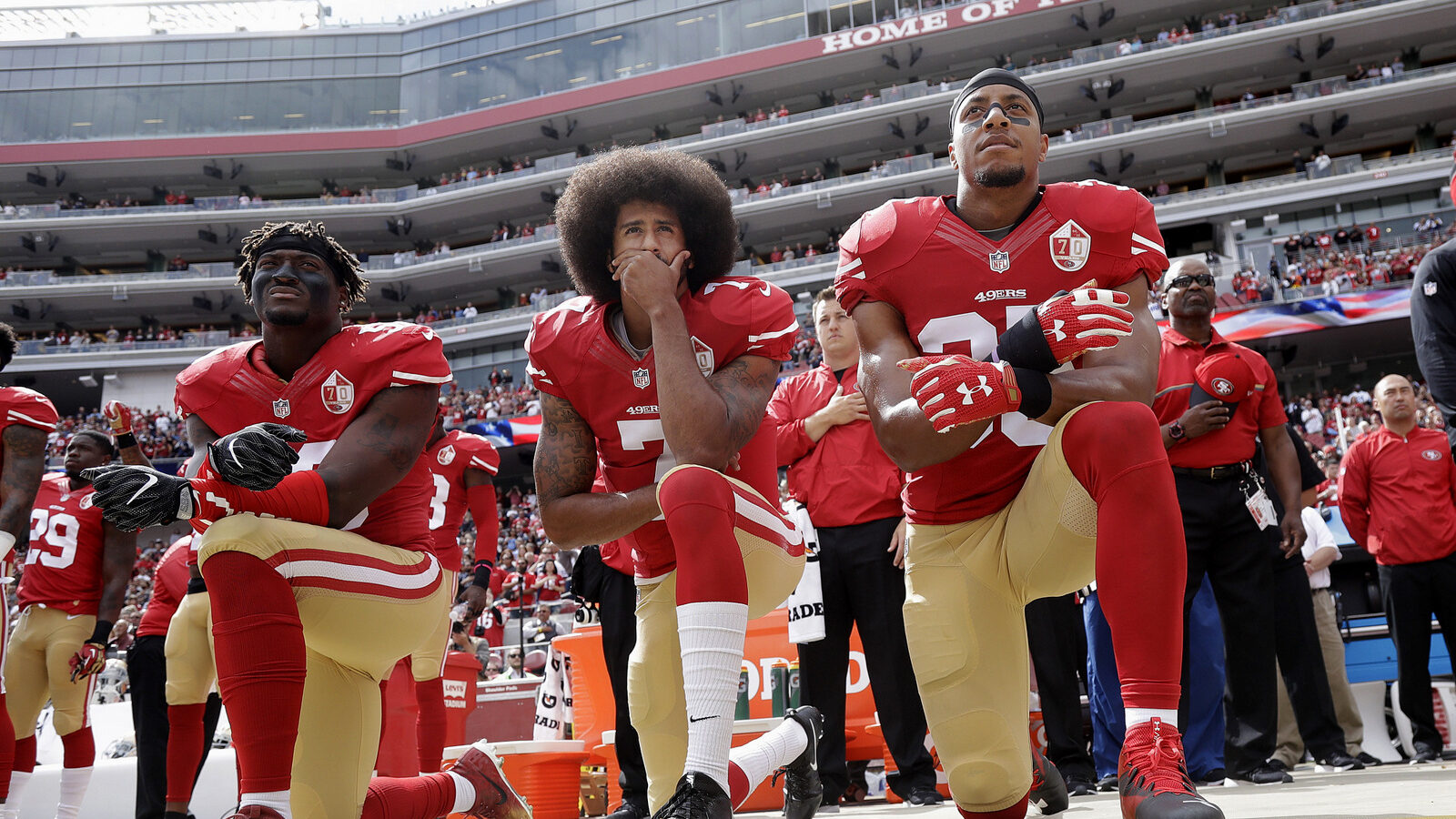After two seasons of NFL players engaging in peaceful, albeit controversial protests against police brutality by kneeling during the national anthem at the start of football games, the organization has banned the practice.
The NFL decided this week that while players may choose to remain off the field for the playing of the star-spangled banner, they will not be permitted to kneel when it plays. If they choose to do so, they can be fined, though the amount has not yet been specified.
This decision is ultimately predictable. Widespread outrage among proud American nationalists and right-wing media outlets spurred a nationwide boycott that saw the NFL’s rating drop significantly.
But the NFL’s submission to America’s pervasive pro-military, hyper-nationalist ideology also highlights the organization’s deep ties to the government itself.
At the local level, the NFL has long enjoyed a lucrative relationship with local governments, which have forked over $4.7 billion in taxpayer funds to pay for stadium construction since 1997. This has only served to further line the pockets of an already profitable organization, which was expected to generate $14 billion in revenue last year.
Though the construction funding came from local governments, individual NFL teams have also profited by directly pushing pro-military propaganda, receiving $6 million over four years conduct ceremonies honoring veterans. The Pentagon has claimed the funds are justifiable because they serve as a marketing tool for recruitment, though they have been unable to offer proof of enlistment as a result of the promotions.
Unsurprisingly, the tradition of playing the national anthem at sporting events began as a way to drum up support for World War I and World War II during baseball games. The NFL, in particular, fed into nationalism and its ties to war during the Vietnam War. As Michael Oriard, a former NFL offensive lineman who is now a professor of English at Oregon State points out, as noted by Vox:
“The league has been acutely sensitive to the politics of its patriotic displays. In 1968, at the height of the controversy over the Vietnam War and hippie counterculture, the NFL positioned itself on the same side as Nixon’s ‘silent majority’ — that is, in favor of the war effort and against mass protests.”
According to Oriard, the NFL’s fusion of nationalism with football peaked immediately after the 9/11 terrorist attacks, and as he has noted, “the NFL has long seen the big game’s patriotic trappings, like overflights by Air Force jets, as a way of selling the NFL writ large.”
“The Super Bowl was chiefly an advertisement for NFL football, investing the game with ‘traditional American values.”
Of course, the power of American patriotism did not originate with sports events. The mandated patriotism the NFL is now imposing has long been enforced in public schools, where students are expected to pledge allegiance to the flag, a symbol of the government (“I pledge allegiance to the flag of the United States of America and to the republic for which it stands…”). Though the pledge was not enacted until the 1950s (and was written by an individual with seemingly un-American “socialist” values), nationalism was promoted in the educational system even earlier.
In 1891, James Russell Parsons Jr., U.S. Consul at Aix-la-Chapelle recommended to the New York State school system that they adopt similar tactics to the autocratic Prussian empire, which placed a strong emphasis on nationalism and love of country. As he wrote in the “Love of Fatherland” section of his report:
“In Prussian schools the utmost pains are taken to foster the spirit of patriotism. The law requires that a likeness of the Emperor be placed in each school-room. Courses of study improve every opportunity to call attention to the importance of cultivating a national spirit. From the cradle, the Prussian child learns the national songs. At every step one is reminded that Prussia is a land of patriots.”
He praised New York for moving toward that with its official celebration of Arbor Day:
“In New York the appointment of Arbor Day was the first movement toward the recognition of the importance of this subject in connection with our schools. This attempt to cultivate a national spirit is most praiseworthy. Teachers and all school officers should spare no pains in developing a proper spirit of patriotism and love of our free institutions.”
Today, students around the country are reprimanded and punished for refusing to participate in nationalistic rituals.
But let’s not forget the reason players have been protesting in the first place: Government agents are killing people without trial even though due process is enshrined in the core values of the country incensed Americans love so much they refuse to tolerate people protesting — another founding principle. As they beat their chests over their collectivist identity, they’re also losing sight of another allegedly American value: individualism.
Meanwhile, cops become even more militaristic with weapons provided by the same military that players will no longer be allowed to criticize when they’re on the field.
Top Photo | San Francisco 49ers outside linebacker Eli Harold, quarterback Colin Kaepernick and safety Eric Reid kneel during the national anthem before an NFL football game against the Dallas Cowboys in Santa Clara, Calif. (AP/Marcio Jose Sanchez)


